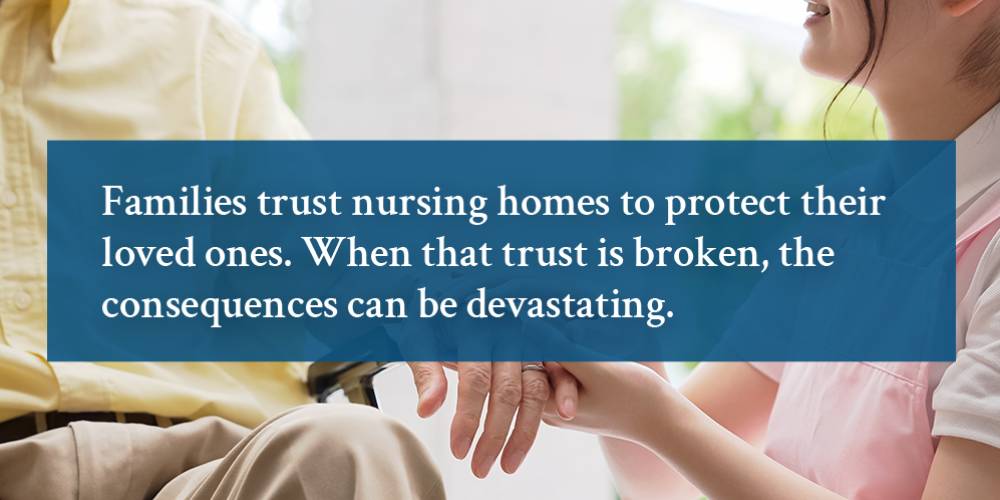Negligent Diabetes Care for Assisted Living and Nursing Home Residents
 The staff in an assisted living facility or nursing home are supposed to provide careful and consistent medical care. For residents with diabetes, staff negligence can be life-threatening. Unfortunately, this is more common than you might expect. Families have the right to hold a facility accountable when poor care causes harm. The experienced Addison, IL assisted living neglect attorneys at Schwartz Injury Law can help you understand your rights and build your claim for compensation.
The staff in an assisted living facility or nursing home are supposed to provide careful and consistent medical care. For residents with diabetes, staff negligence can be life-threatening. Unfortunately, this is more common than you might expect. Families have the right to hold a facility accountable when poor care causes harm. The experienced Addison, IL assisted living neglect attorneys at Schwartz Injury Law can help you understand your rights and build your claim for compensation.
Understanding Proper Diabetes Care in a Long-Term Facility in Illinois
People with diabetes need careful management every day. In a nursing home or assisted living setting, the staff must follow a clear medical plan that comes from the resident’s doctor.
Good diabetes care means more than just giving insulin. Staff should check blood sugar levels regularly to make sure they stay within a safe range. They should provide meals that suit a diabetic diet and watch for warning signs of low or high blood sugar.
If blood sugar becomes dangerously low or high, staff must act immediately. This might mean giving glucose, calling a doctor, or getting emergency help. The Illinois Nursing Home Care Act requires nursing homes to provide "adequate and properly supervised nursing care." That means they must have trained staff who know how to care for residents with conditions like diabetes. When they fail to meet this standard, the facility can be held responsible for the harm caused.
What Does Negligent Diabetes Care in a Nursing Home or Assisted Living Facility Look Like?
Negligence happens when caregivers fail to use the proper level of care. It basically means they did not act as a careful and competent professional would in the same situation. Common examples include:
-
Forgetting or skipping insulin doses
-
Giving the wrong type or amount of insulin
-
Failing to check blood sugar often enough
-
Ignoring signs of hypoglycemia (low blood sugar) or hyperglycemia (high blood sugar)
-
Serving meals that do not follow the resident’s medical diet
-
Failing to call a doctor or get emergency help when needed
-
Not keeping accurate records of blood sugar readings or insulin doses
-
Allowing untrained or unqualified staff to handle diabetic care tasks
Even one mistake can be dangerous, especially for older residents. It can lead to diabetic coma, severe infections, or organ failure.
How Does Illinois Law Protect Nursing Home Residents
The Illinois Nursing Home Care Act protects nursing home residents from abuse and neglect by establishing their right to receive proper medical treatment, respectful care, and protection from harm. Additionally, the Adult Protective Services Act requires healthcare workers and other professionals to report any suspected abuse or neglect of elderly or disabled adults. This includes medical neglect, such as failing to give needed medication or not calling for help during a medical emergency.
These laws are meant to ensure that nursing homes and assisted living facilities provide safe environments for residents. When a facility fails to provide proper care or ignores the laws meant to protect residents, it can be held accountable. Nursing homes that break these rules may face fines and other civil penalties, as long as there is evidence that they breached their duty.
Proving Negligence in a Nursing Home Diabetes Care Case
To prove negligence, you must show that the nursing home or its staff failed to provide the level of care required by law. Then, you have to connect that failure to the harm that you or your loved one suffered.
Building this type of case often requires a detailed investigation. Your attorney may review medical charts, staff schedules, and medication records to find inconsistencies or errors. Testimony from other residents or family members can support your claims. You can also use medical experts to explain how the facility’s actions fell short of accepted professional standards.
When nursing home neglect causes serious injury, some residents can recover with medical treatment and time. But in the worst cases, poor diabetes care can lead to deadly problems like infection, organ failure, or diabetic coma. Losing a loved one because of a facility’s carelessness is heartbreaking, especially when the death could have been avoided. The Illinois Wrongful Death Act, under 740 ILCS 180/2, holds nursing homes responsible when neglect leads to a resident’s death. Families may be able to recover compensation for medical costs, pain and suffering, and the emotional loss of a loved one.

What Should You Do if You Suspect Nursing Home Negligence in Illinois?
If you believe your loved one is being neglected in a nursing home or assisted living facility, act quickly. Taking action can protect your loved one’s health and help stop further neglect. Some basic steps to follow include:
-
Keep records: Write down everything you notice. This includes dates, symptoms, and conversations with staff. Keep copies of care plans and medical charts.
-
Report your concerns: Notify the facility’s management and file a complaint with the Illinois Department of Public Health (IDPH). This agency investigates reports of nursing home abuse and neglect.
-
Get medical care: If your loved one is in immediate danger, call 911 or take them to the hospital.
-
Talk to a lawyer: A lawyer who handles nursing home neglect cases will get to work immediately to protect your loved one and file a claim.
Contact an Addison, IL Nursing Home Abuse Attorney Today
At Schwartz Injury Law, you will speak directly with a real lawyer, not an intake service. Our attorneys take the time to listen, answer your questions, and explain every step of your case. We are dedicated to standing up for victims of nursing home abuse and neglect. Our legal team has won many six- and seven-figure verdicts and settlements for our clients. We know how to take on powerful nursing home companies and win.
When you reach out to our St. Claire County, IL assisted living lawyers, you can trust that your case will receive personal attention from experienced attorneys who care. Contact us today at 312-535-4625 for a free consultation to learn more about how the laws apply to your specific case.

 312-535-4625
312-535-4625





